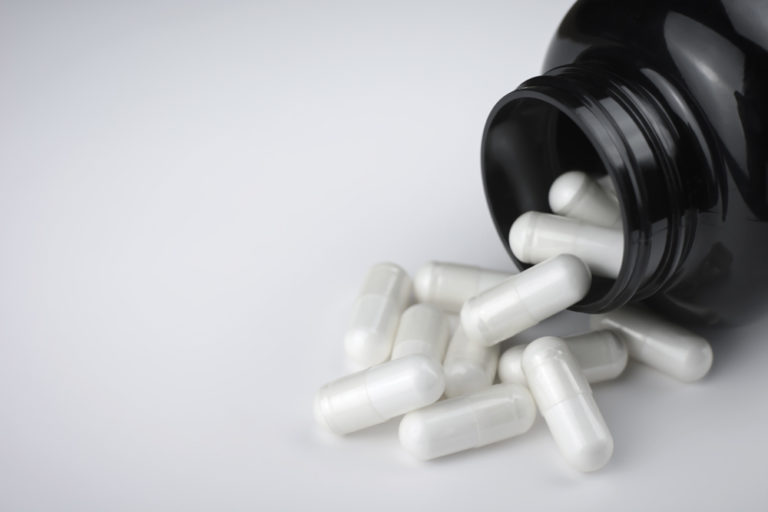Stress and anxiety are commonplace for many Americans—and there is a class of medications known as benzodiazepines that are widely prescribed for anxiety. In fact, hundreds of millions of prescriptions for benzodiazepines are written every year.1 L-theanine (gamma-ethyl-amino-L-glutamic acid) is a neurologically active amino acid, which is also used for stress and anxiety.2 While benzodiazepines can certainly be effective pharmacological agents for treating anxiety, they are not without adverse effects. Consequently, safer, viable alternatives to benzodiazepines, such as L-theanine, are desirable. This article will compare and contrast benzodiazepine drugs and L-theanine.
Common Benzodiazepines, Mechanism of Action and Side Effects
Common benzodiazepines prescribed in the United States include:3
• alprazolam (Xanax)
• chlordiazepoxide (Librium)
• clonazepam (Klonopin)
• clorazepate (Tranxene)
• diazepam (Valium)
• estazolam (Prosom)
• flurazepam (Dalmane)
• lorazepam (Ativan)
• midazolam (Versed)
• oxazepam (Serax)
• temazepam (Restoril)
• triazolam (Halcion)
• quazepam (Doral)
Benzodiazepines’ mechanism of action involves gamma amino butyric acid (GABA), the most common neurotransmitter in the central nervous system. GABA is inhibitory in nature and thus reduces the excitability of neurons, which in turn produces a calming effect on the brain. The three GABA receptors in the body are designated as A, B and C. Benzodiazepines bind to the GABA-A receptor, which potentiates GABAergic neurotransmission.4
Common side effects of benzodiazepines include drowsiness, lethargy, and fatigue, while higher doses of benzodiazepines can result in impaired motor coordination, dizziness, vertigo, slurred speech, blurry vision, mood swings, as well as hostile or erratic behavior. Furthermore, benzodiazepines are slowly eliminated from the body, which means that repeated doses over a prolonged period can result in significant accumulation in fatty tissues. Consequently, some symptoms of overmedication (impaired thinking, disorientation, confusion, slurred speech) can appear over time.5
L-theanine, Mechanisms of Action and Side Effects
L-theanine is a predominant amino acid found in green tea, comprising one to three percent of its content.6,7 Likewise, L-theanine is found in some mushrooms.8
L-theanine appears to have multiple mechanism of action. Arguably most well-known is the fact that, according to human electroencephalograph (EEG) studies, it significantly increases brain activity in the alpha frequency band. This is associated with relaxing the mind without inducing drowsiness.9 In addition, L-theanine is structurally similar to the excitatory neurotransmitter glutamate, allowing it to weakly bind to glutamate receptors, which apparently inhibits glutamate excitotoxicity.*10 Furthermore, L-theanine increases serotonin, dopamine, GABA, and glycine levels in various areas of the brain,11,12 although some research suggests it may also lower serotonin level.13
Unlike benzodiazepine drugs, no adverse effects have been reported with L-theanine use.14
Studies On L-theanine
Various placebo-controlled human studies have examined the effects of L-theanine on stress and anxiety.15,16,17,18 The results showed benefits of L-theanine over placebo, including:
• Reduction in some physiological indicators of stress within 15 minutes
• Reductions in heart rate were likely attributable to a reduction of sympathetic nervous activation
• Anti-stress effects via the inhibition of cortical neuron excitation
• Suppressing the initial stress response
• Significantly reducing anxiety and reduced the blood-pressure increase in high-stress-response adults.
In addition, human research has shown that supplementation with L-theanine helped mental focus as demonstrated by an ability to significantly reduce error rates during a sustained attention task,19 and also by improving the processes of filtering out redundant or unnecessary stimuli in the brain from all possible environmental stimuli.20
These studies generally used between 100-200 mg of L-theanine daily, although some research has shown benefit with as little as 50 mg.21
Research Comparing L-theanine and Benzodiazepines
Back in 2004, a double-blind, placebo-controlled human study22 was conducted comparing the effects of 200 mg/day of L-theanine, 1 mg/day of alprazolam (Xanax) or a placebo on measures of anxiety as part of a relaxed and experimentally induced anxiety condition. It is worth noting that 1 mg is a significant dose of alprazolam, since doses of 0.25 mg and 0.50 mg/day are often prescribed. The results showed evidence for relaxing effects of L-theanine over alprazolam or placebo with regard to whether a person felt tranquil versus troubled—although none of the groups has significant effects during the induced acute anxiety state. Of course the best way to use L-theanine is on a daily basis, not just during an acute anxiety situation.
Conclusion
L-theanine may offer a viable alternative to common benzodiazepine medications. In any case, it is not advisable to simply stop use of prescribed benzodiazepines and switch to L-theanine. The best way to assess the situation is to discuss it with a healthcare professional. If no anti-anxiety medication is currently in use, L-theanine is certainly worth trying in the first instance. VR
References:
1 Cascade E, Kalali AH. Use of benzodiazepines in the treatment of anxiety. Psychiatry (Edgmont) 2008 Sep;5(9):21–22.
2 Juneja LR, Chu D-C, Okubo T, Nagato Y, Yokogoshi H. L-theanine—a unique amino acid of green tea and its relaxation effect in humans. Trends Food Sci Tech. 1999;10:199-204
3 Ogbru A. Benzodiazepine Drug Information. RxList Inc. Medically Reviewed on April 2, 2015. Retrieved on June 15, 2015 from http://www.rxlist.com/benzodiazepines/drugs-condition.htm.
4 Griffin CE, Kaye AM, Bueno FR, Kaye AD. Benzodiazepine Pharmacology and Central Nervous System–Mediated Effects. Ochsner J. 2013 Summer; 13(2): 214–223.
5 Fox C, Liu H, Kaye AD. Antianxiety Agents. In Manchikanti L, Trescot AM, Christo PJ, et al (eds). Clinical Aspects of Pain Medicine and Interventional Pain Management: A Comprehensive Review. Paducah, KY: ASIP Publishing;2011:543–552.
6 Kakuda T, Yanase H, Utsunomiya K, et al. Protective effect of gamma-glutamylethylamide (theanine) on ischemic delayed neuronal death in gerbils. Neurosci Lett 2000;289:189-92.
7 Sadzuka Y, Sugiyama T, Sonobe T. Efficacies of tea components on doxorubicin induced antitumor activity and reversal of multidrug resistance. Toxicol Lett 2000;114:155-62.
8 Lu K, Gray MA, Oliver C, et al. The acute effects of L-theanine in comparison with alprazolam on anticipatory anxiety in humans. Hum Psychopharmacol. 2004 Oct;19(7):457-65
9 Nobre AC, Rao A, Owen GN. L-theanine, a natural constituent in tea, and its effect on mental state. Asia Pac J Clin Nutr 2008;17 Suppl 1:167-8.
10 Nathan P, Lu K, Gray M, Oliver C. The Neuropharmacology of L-Theanine(N-Ethyl-L-Glutamine). J Herbal Pharmacother. 2006;6(2):21–30.
11 Nathan P, Lu K, Gray M, Oliver C. The Neuropharmacology of L-Theanine (N-Ethyl-L-Glutamine). J Herbal Pharmacother. 2006;6(2):21–30.
12 Egashira N, Hayakawa K, Osajima M, Mishima K, Iwasaki K, Oishi R, Fujiwara M. Involvement of GABA(A) receptors in the neuroprotective effect of theanine on focal cerebral ischemia in mice. J Pharmacol Sci. 2007 Oct;105(2):211-4.
13 Yokogoshi H, Kobayashi M, Mochizuki M, Terashima T. akehiko (1998). Effect of theanine, γ-glutamylethylamide, on brain monoamines and striatal dopamine release in conscious rats. Neurochemical Research. 1998;23(5):667–73.
14 Theanine. Natural Medicines Comprehensive Database. Monograph last reviewed on December 17, 2012; last updated on March 6, 2015. Retrieved on June 15, 2015 from http://naturaldatabase.therapeuticresearch.com/nd/Search.aspx?rn=2&cs=&s=ND&pt=100&id=1053&fs=ND&searchid=52048078.
15 Kimura K, Ozeki M, Juneja LR, Ohira H. L-Theanine reduces psychological and physiological stress responses. Biol Psychol 2007;74(1):39-45
16 Unno K, Tanida N, Ishii N, et al. Anti-stress effect of theanine on students during pharmacy practice: positive correlation among salivary α-amylase activity, trait anxiety and subjective stress. Pharmacol Biochem Behav. 2013 Oct;111:128-35.
17 Yoto A, Motoki M, Murao S, Yokogoshi H. Effects of L-theanine or caffeine intake on changes in blood pressure under physical and psychological stresses. J Physiol Anthropol. 2012 Oct 29;31:28.
18 Higashyama A, Htay HH, Ozeki M, Juneja LR, Kapoor MP. Effects of l-theanine on attention and reaction time response. Journal of Functional Foods. 2011;3(3):171–178.
19 Foxe JJ, Morie KP, Laud PJ, Rowson MJ, de Bruin EA, Kelly SP. Assessing the effects of caffeine and theanine on the maintenance of vigilance during a sustained attention task. Neuropharmacology. 2012 Jun;62(7):2320-7.
20 Ota M, Wakabayashi C, Matsuo J, et al. Effect of L-theanine on sensorimotor gating in healthy human subjects. Psychiatry Clin Neurosci. 2014 May;68(5):337-43.
21 Mason,R. 200 mg of Zen. Alternative & Complementary Therapies 2001; 7(2):91-95.
22 Lu K, Gray MA, Oliver C, Liley DT, Harrison BJ, Bartholomeusz CF, Phan KL, Nathan PJ. The acute effects of L-theanine in comparison with alprazolam on anticipatory anxiety in humans. Hum Psychopharmacol. 2004 Oct;19(7):457-65.










